Charles E W Bean, Diaries, AWM38 3DRL 606/251/1 - 1915 - 1936 - Part 18
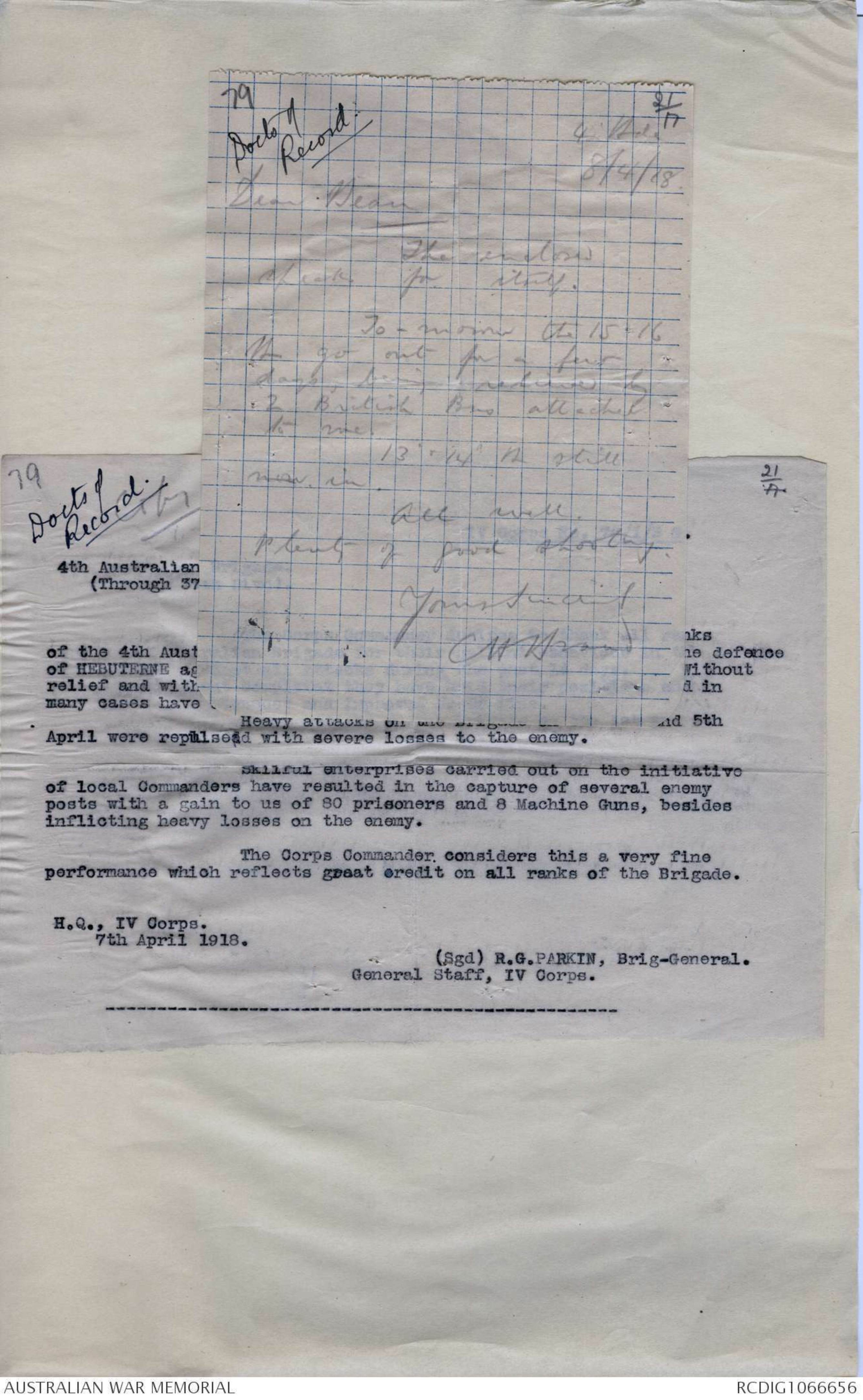
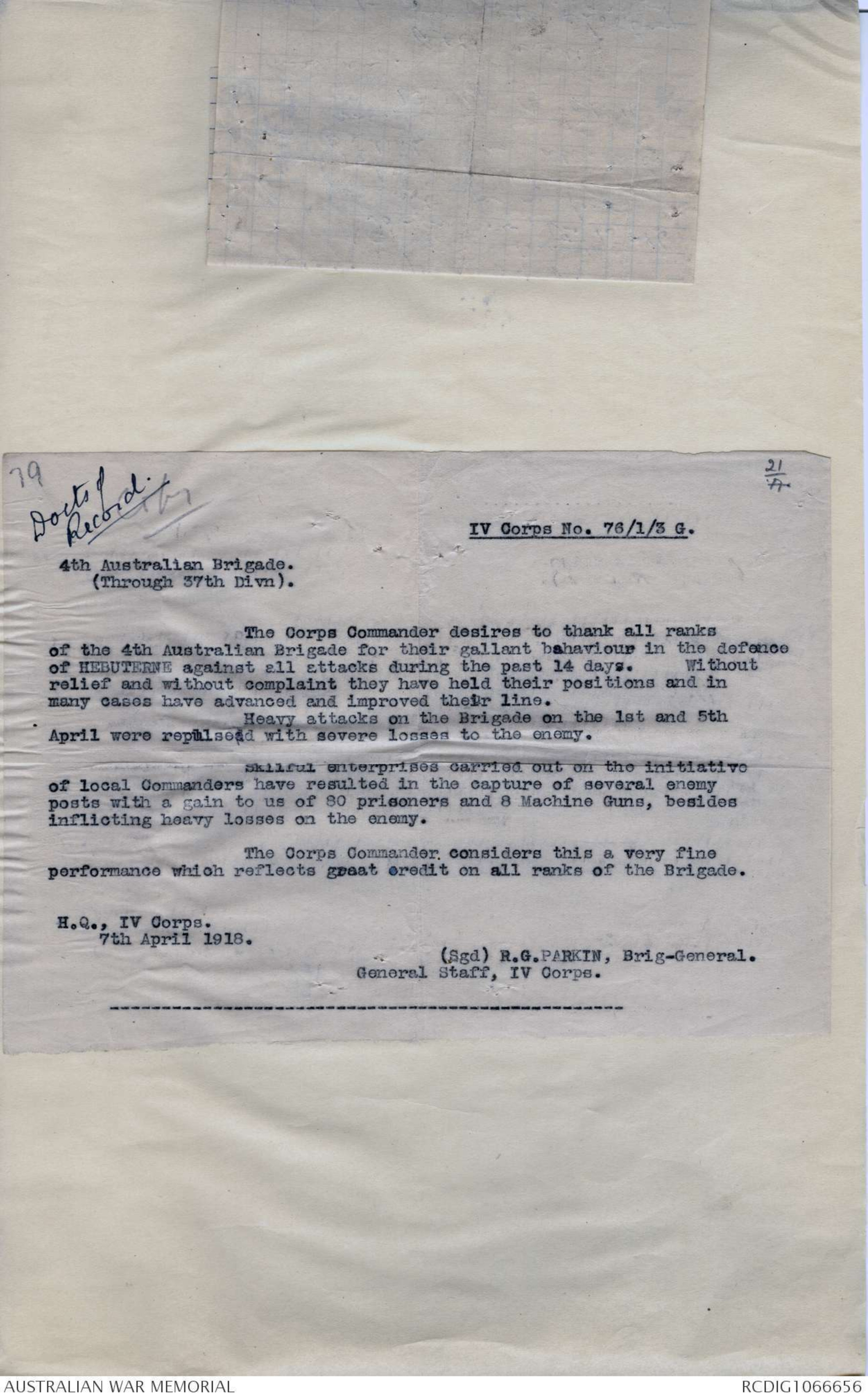
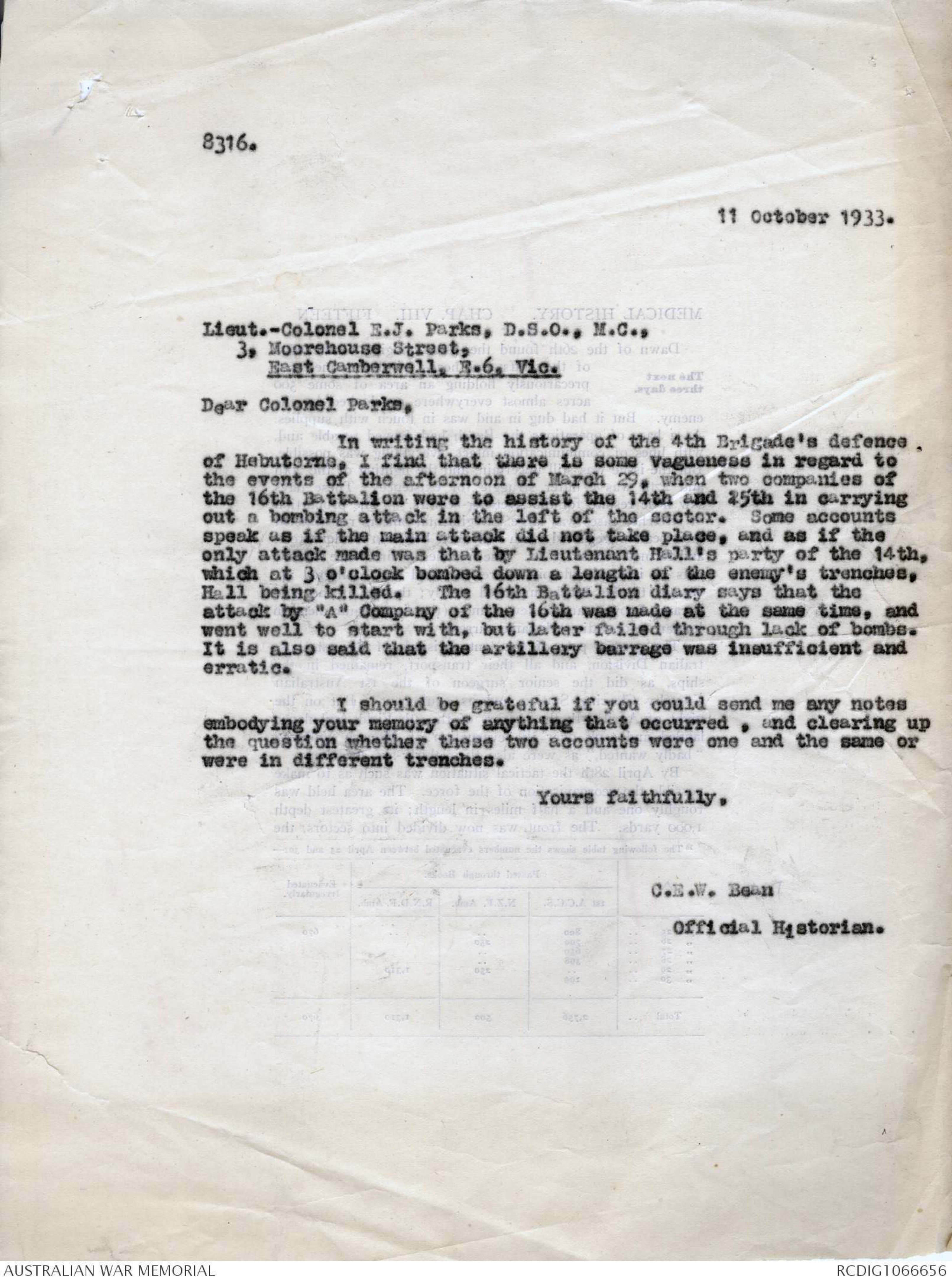
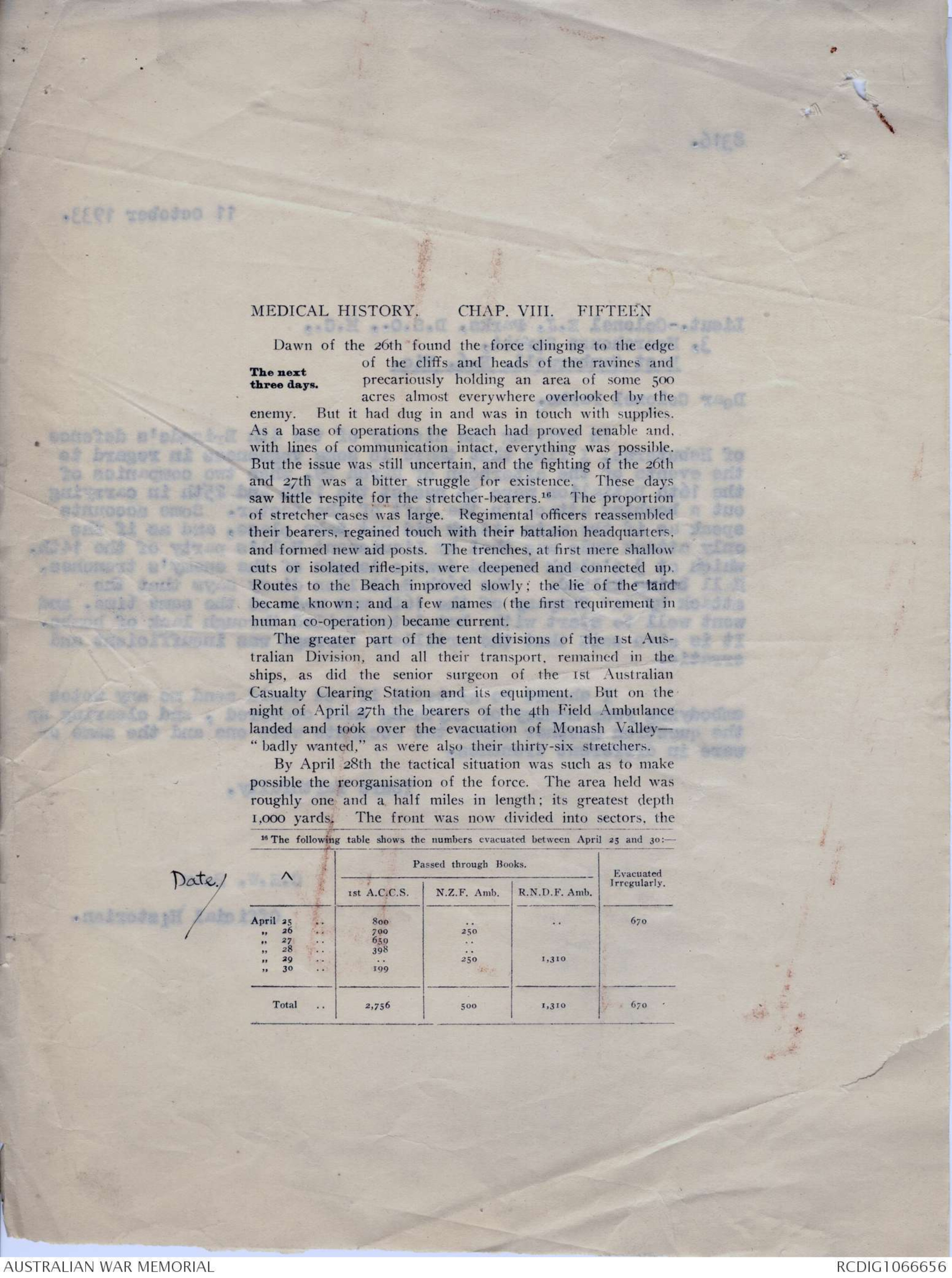
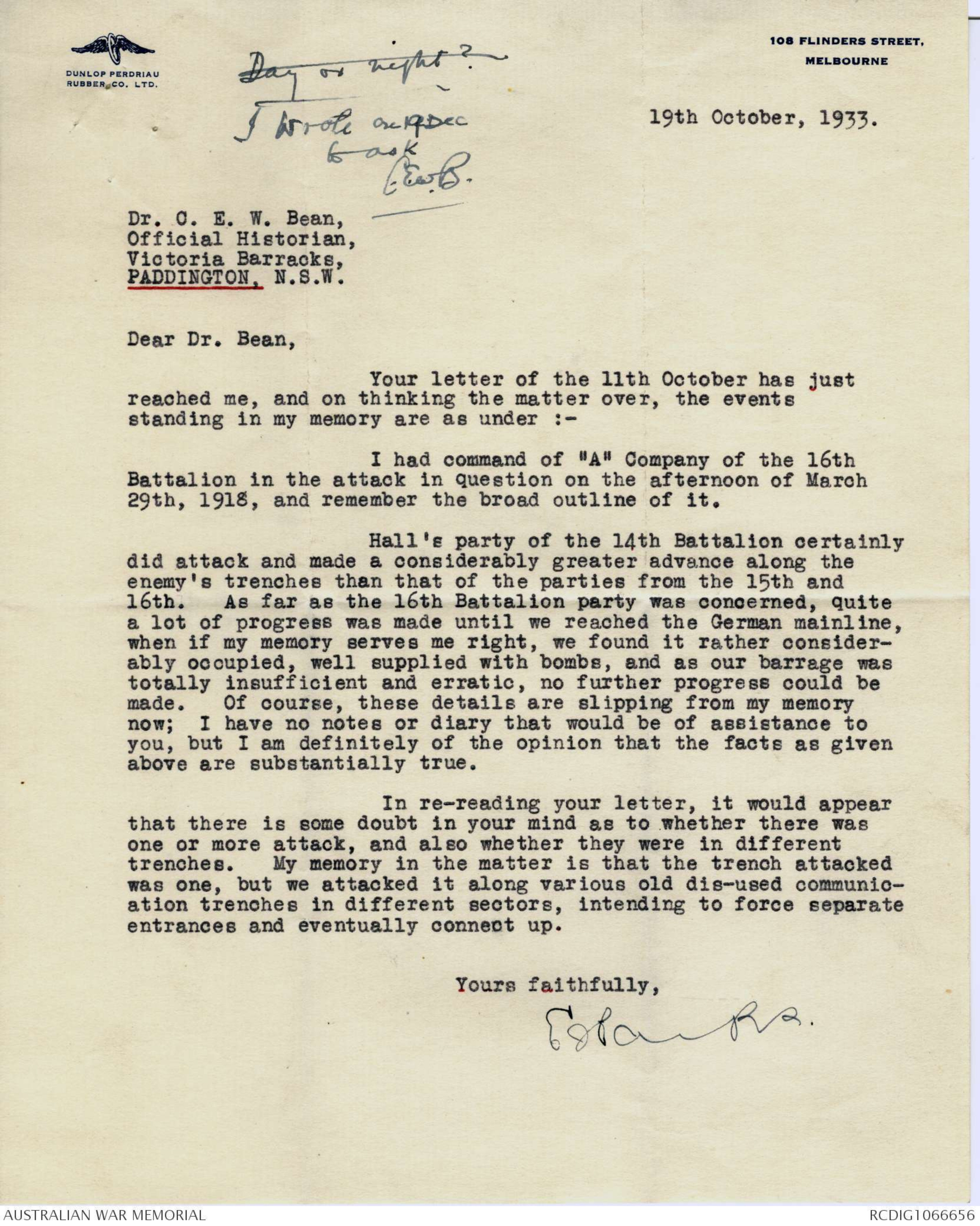
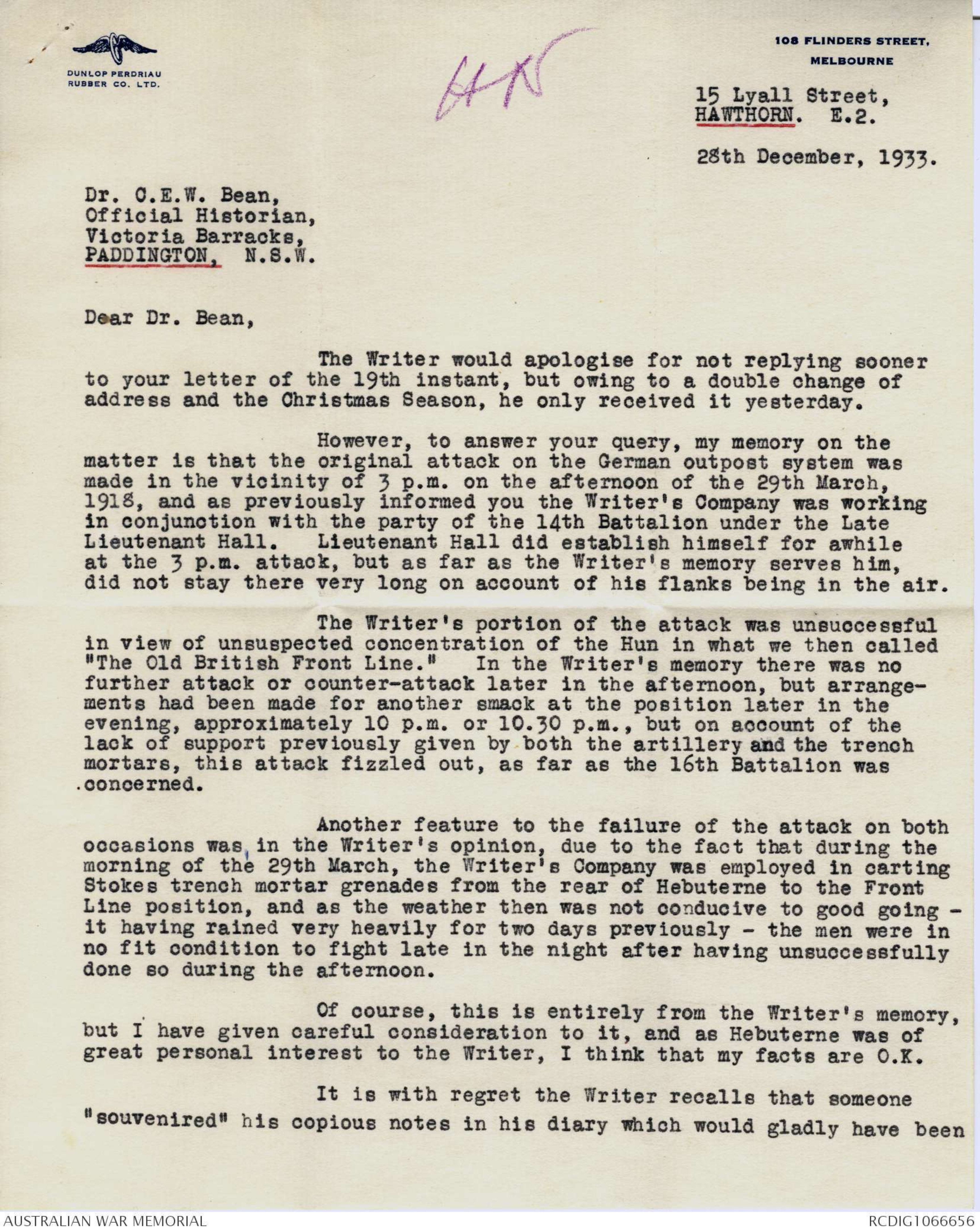
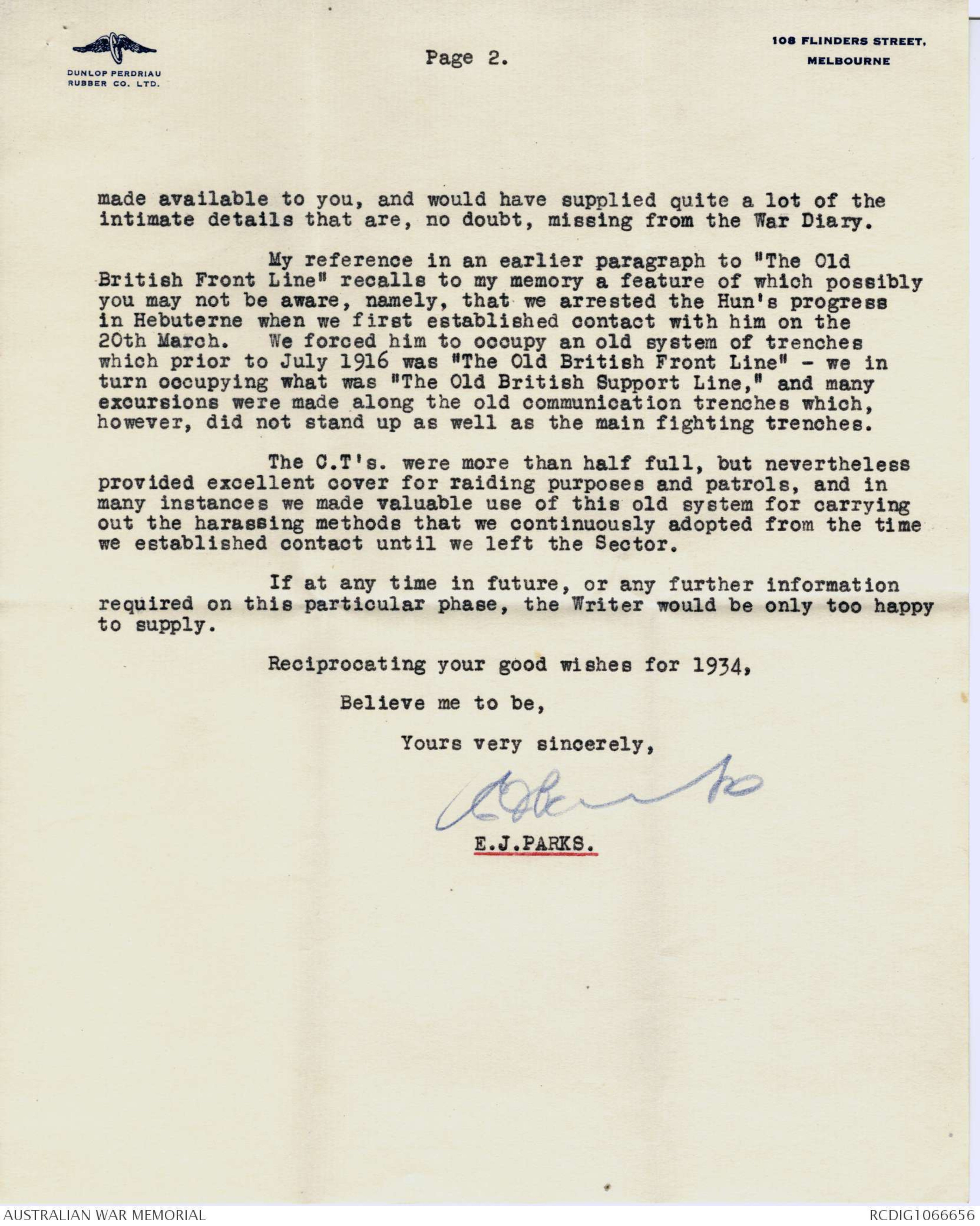
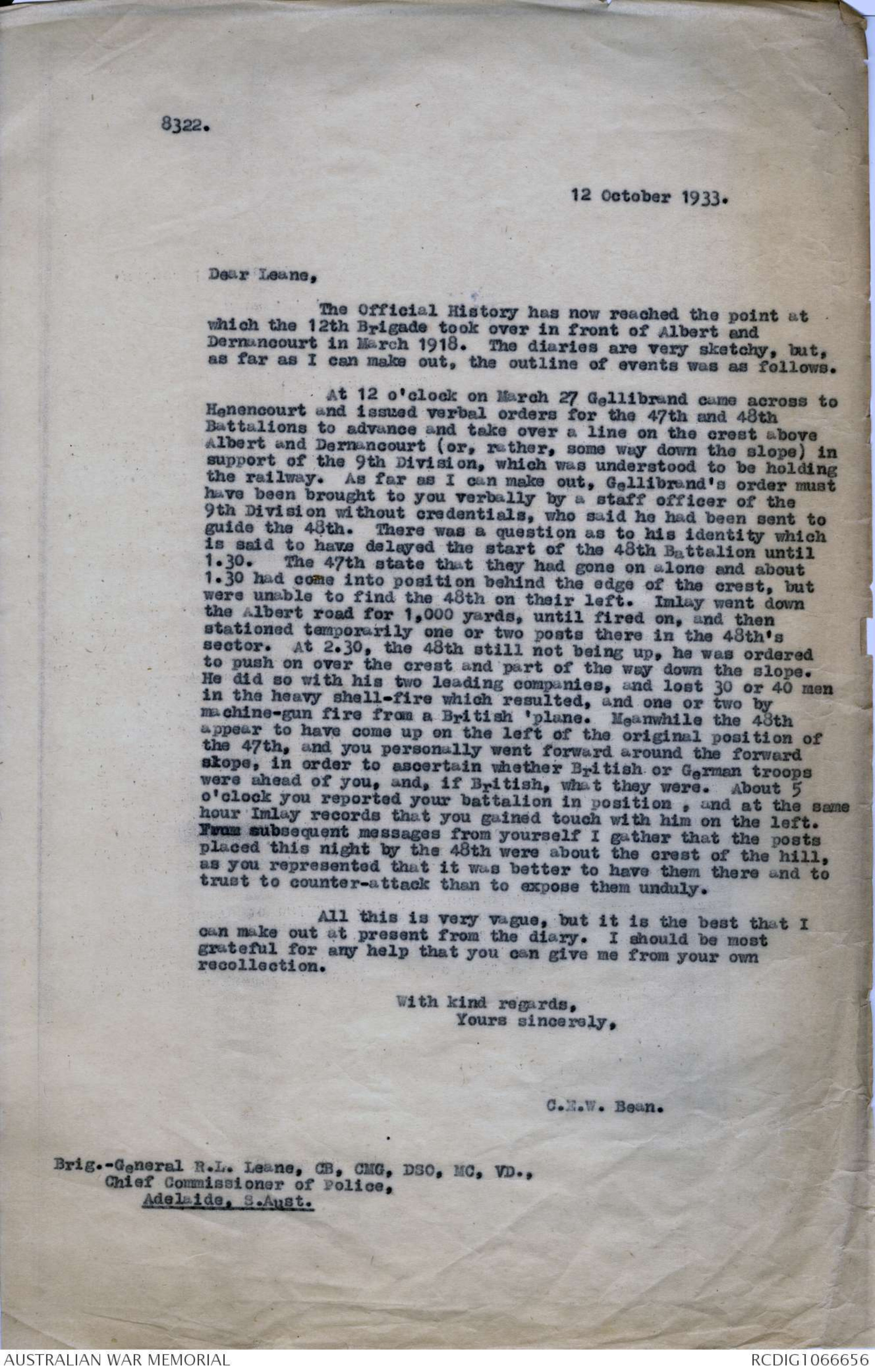
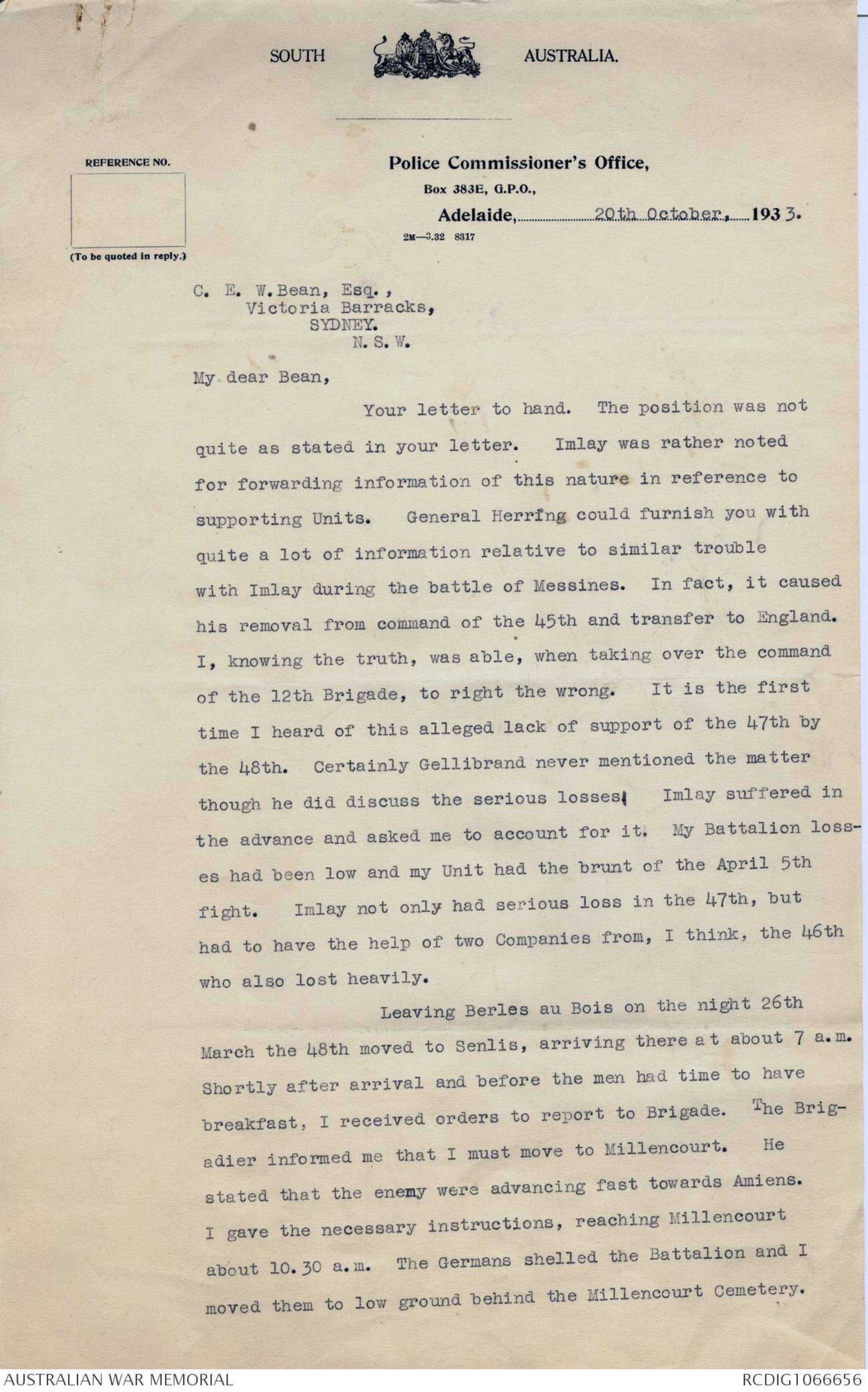
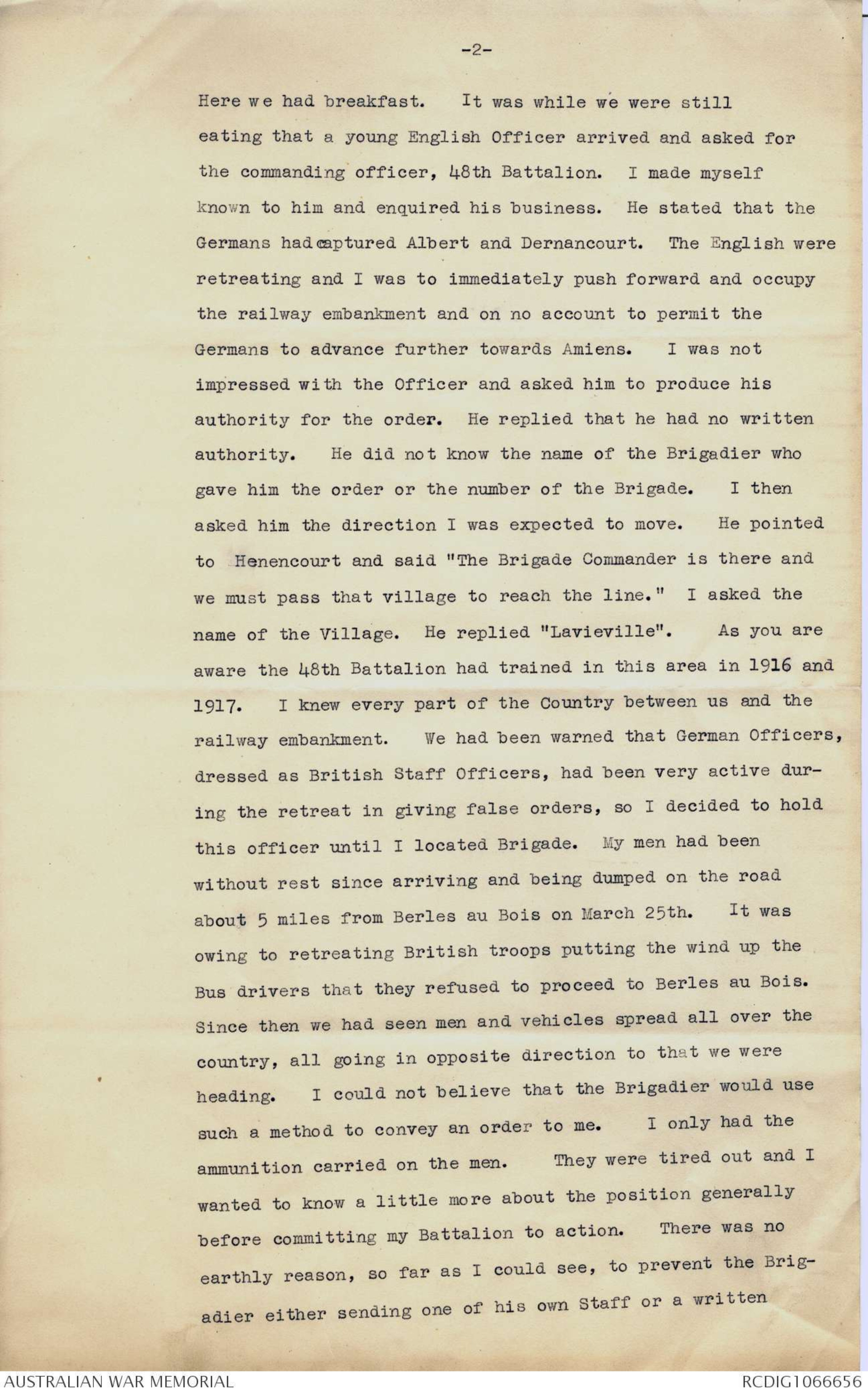
79
Docts of
Record.
21/17
42 Bde
8/4/18.
Dear Bean
The enclosed
speak for itself.
To-morrow the 15 - 16
Bn go out for a few
days being relieved by
2 British Bns attached
to me.
13 - 14 Bn still
now in.
All well.
plenty of good shooting.
Your sincerely
C H Brand
79 21/A
Docts of
Record.
IV Corps No. 76/1/3 G.
4th Australian Brigade.
(Through 37th Divn).
The Corps Commander desires to thank all ranks
of the 4th Australian Brigade for their gallant behaviour in the defence
of HEBUTERNE against all attacks during the past 14 days. Without
relief and without complaint they have held their positions and in
many cases have advanced and improved their line.
Heavy attacks on the Brigade on the 1st and 5th
April wore repulsed with severe losses to the enemy.
Skilful enterprises carried out on the initiative
of local Commanders have resulted in the capture of several enemy
posts with a gain to us of 80 prisoners and 8 Machine Guns, besides
inflicting heavy losses on the enemy.
The Corps Commander considers this a very fine
performance which reflects great credit on all ranks of the Brigade.
H.Q., IV Corps
7th April 1918.
(Sgd) R.G.PARKIN, Brig-General.
General Staff, IV Corps.
---------------------------------------
8316.
11 October 1933.
Lieut.-Colonel E.J. Parks. D.S.O., M.C.,
3, Moorehouse Street,
East Camberwell, E.6. Vic.
Dear Colonel Parks,
In writing the history of the 4th Brigade's defence
of Hebuterns, I find that there is some vagueness in regard to
the events of the afternoon of March 29, when two companies of
the 16th Battalion were to assist the 14th and 15th in carrying
out a bombing attack in the left of the sector. Some accounts
speak as if the main attack did not take place, and as if the
only attack made was that by Lieutenant Hall's party of the 14th,
which at 3 o'clock bombed down a length of the enemy's trenches,
Hall being killed. The 16th Battalion diary says that the
attack by "A" Company of the 16th was made at the same time, and
went well to start with, but later failed through lack of bombs.
It is also said that the artillery barrage was insufficient and
erratic.
I should be grateful if you could send me any notes
embodying your memory of anything that occurred, and clearing up
the question whether these two accounts wore one and the same or
were in different trenches.
Yours faithfully,
C.E.W. Bean
Official Historian.
MEDICAL HISTORY, CHAP VIII. FIFTEEN
Dawn of the 26th found the force clinging to the edge
of the cliffs. and heads of the ravines and
[*The next
three days.*]
precariously holding an area of some
500 acres almost everywhere, overlooked by the
enemy. But it had dug in and was in touch with supplies.
As a base of operations the Beach had proved tenable and,
with lines of communication intact, everything was possible.
But the issue was still uncertain, and the fighting of the 26th
and 27th was a bitter struggle for existence. These days
saw little respite for the stretcher-bearers.16 The proportion
of stretcher cases was large. Regimental officers reassembled
their bearers, regained touch with their battalion headquarters,
and formed new aid posts. The trenches, at first mere shallow
cuts or isolated rifle-pits, were deepened and connected up.
Routes to the Beach improved slowly; the lie of the land
became known; and a few names (the first requirement in
human co-operation) became current.
The greater part of the tent divisions of the 1st Australian
Division, and all their transport, remained in the
ships, as did the senior surgeon of the 1st Australian
Casualty Clearing Station and its equipment. But on the
night of April 27th the bearers of the 4th Field Ambulance
landed and took over the evacuation of Monash Valley —
"badly wanted," as were also their thirty-six stretchers.
By April 28th the tactical situation was such as to make
possible the reorganisation of the force. The area held was
roughly one and a half miles in length; its greatest depth
1,000 yards, The front was now divided into sectors, the
| 16 The following table shows the numbers evacuated between April 25 and 30:— | ||||
| ^Date. | Passed through Books | Evacuated Irregularly. |
||
| 1st A.C.C.S. | N.Z.F. Amb. | R.N.D.F. Amb. | ||
| April 25 . . | 800 | . . | 670 | |
| " 26 . . | 700 | 250 | ||
| " 27 . . | 650 | . . | ||
| " 28 . . | 398 | . . | ||
| " 29 . . | . . | 250 | 1,310 | |
| " 30 . . | 199 | |||
| Total . . | 2,756 | 500 | 1,310 | 670 |
DUNLOP PERDRIAU
RUBBER CO. LTD.
108 FLINDERS STREET
MELBOURNE
19th October, 1933.
Day or night?
I wrote on 19 Dec
to ask
C. E. W. B.
Dr. C. E. W. Bean,
Official Historian,
Victoria Barracks,
PADDINGTON, N.S.W.
Dear Dr. Bean,
Your letter of the 11th October has just
reached me, and on thinking the matter over, the events
standing in my memory are as under : -
I had command of "A" Company of the 16th
Battalion in the attack in question on the afternoon of March
29th, 1918, and remember the broad outline of it.
Hall's party of the 14th Battalion certainly
did attack and made a considerably greater advance along the
enemy's trenches than that of the parties from the 15th and
16th. As far as the 16th Battalion party was concerned, quite
a lot of progress was made until we reached the German mainline,
when if my memory serves me right, we found it rather considerably
occupied, well supplied with bombs, and as our barrage was
totally insufficient and erratic, no further progress could be
made. Of course, these details are slipping from my memory
now; I have no notes or diary that would be of assistance to
you, but I am definitely of the opinion that the facts as given
above are substantially true.
In re-reading your letter, it would appear
that there is some doubt in your mind as to whether there was
one or more attack, and also whether they were in different
trenches. My memory in the matter is that the trench attacked
was one, but we attacked it along various old dis-used communication
trenches in different sectors, intending to force separate
entrances and eventually connect up.
Yours faithfully,
E J Parks
DUNLOP PERDRIAU
RUBBER CO. LTD.
108 FLINDERS STREET
MELBOURNE
15 Lyall Street,
HAWTHORN. E.2.
28th December, 1933.
Dr. C.E.W. Bean,
Official Historian,
Victoria Barracks,
PADDINGTON, N.S.W.
Dear Dr. Bean,
The Writer would apologise for not replying sooner
to your letter of the 19th instant, but owing to a double change of
address and the Christmas Season, he only received it yesterday.
However, to answer your query, my memory on the
matter is that the original attack on the German outpost system was
made in the vicinity of 3 p.m. on the afternoon of the 29th March,
1918, and as previously informed you the Writer's Company was working
in conjunction with the party of the 14th Battalion under the Late
Lieutenant Hall. Lieutenant Hall did establish himself for awhile
at the 3 p.m. attack, but as far as the Writer's memory serves him,
did not stay there very long on account of his flanks being in the air.
The Writer's portion of the attack was unsuccessful
in view of unsuspected concentration of the Hun in what we then called
"The Old British Front Line." In the Writer's memory there was no
further attack or counter-attack later in the afternoon, but arrangements
had been made for another smack at the position later in the
evening, approximately 10 p.m. or 10.30 p.m., but on account of the
lack of support previously given by both the artillery and the trench
mortars, this attack fizzled out, as far as the 16th Battalion was
.concerned.
Another feature to the failure of the attack on both
occasions was, in the Writer's opinion, due to the fact that during the
morning of the 29th March, the Writer's Company was employed in carting
Stokes trench mortar grenades from the rear of Hebuterne to the Front
Line position, and as the weather then was not conducive to good going -
it having rained very heavily for two days previously - the men were in
no fit condition to fight late in the night after having unsuccessfully
done so during the afternoon.
Of course, this is entirely from the Writer's memory,
but I have given careful consideration to it, and as Hebuterne was of
great personal interest to the Writer, I think that my facts are O.K.
It is with regret the Writer recalls that someone
"souvenired" his copious notes in his diary which would gladly have been
Page 2.
DUNLOP PERDRIAU
RUBBER CO. LTD.
108 FLINDERS STREET
MELBOURNE
made available to you, and would have supplied quite a lot of the
intimate details that are, no doubt, missing from the War Diary.
My reference in an earlier paragraph to "The Old
British Front Line" recalls to my memory a feature of which possibly
you may not be aware, namely, that we arrested the Hun's progress
in Hebuterne when we first established contact with him on the
20th March. We forced him to occupy an old system of trenches
which prior to July 1916 was "The Old British Front Line" - we in
turn occupying what was "The Old British Support Line," and many
excursions were made along the old communication trenches which,
however, did not stand up as well as the main fighting trenches.
The C.T's. were more than half full, but nevertheless
provided excellent cover for raiding purposes and patrols, and in
many instances we made valuable use of this old system for carrying
out the harassing methods that we continuously adopted from the time
we established contact until we left the Sector.
If at any time in future, or any further information
required on this particular phase, the Writer would be only too happy
to supply.
Reciprocating your good wishes for 1934,
Believe me to be,
Yours very sincerely,
E J Parks
E.J.PARKS.
8322.
12 October 1933.
Dear Leane,
The Official History has now reached the point at
which the 12th Brigade took over in front of Albert and
Dernancourt in March 1918. The diaries are very sketchy, but,
as far as I can make out, the outline of events was as follows.
At 12 o'clock on March 27 Gellibrand came across to
Henencourt and issued verbal orders for the 47th and 48th
Battalions to advance and take over a line on the crest above
Albert and Dernancourt (or, rather, some way down the slope) in
support of the 9th Division, which was understood to be holding
the railway. As far as I can make out, Gellibrand's order must
have been brought to you verbally by a staff officer of the
9th Division without credentials, who said he had been sent to
guide the 48th. There was a question as to his identity which
is said to have delayed the start of the 48th Battalion until
1.30. The 47th state that they had gone on alone and about
1.30 had come into position behind the edge of the crest, but
were unable to find the 48th on their left. Imlay went down
the Albert road for 1,000 yards, until fired on, and then
stationed temporarily one or two posts there in the 48th's
sector. At 2.30, the 48th still not being up, he was ordered
to push on over the crest and part of the way down the slope.
He did so with his two leading companies, and lost 30 or 40 men
in the heavy shell-fire which resulted, and one or two by
machine-gun fire from a British 'plane. Meanwhile the 48th
appear to have come up on the left of the original position of
the 47th, and you personally went forward around the forward
slope, in order to ascertain whether British or German troops
were ahead of you, and, if British, what they were. About 5
o'clock you reported your battalion in position, and at the same
hour Imlay records that you gained touch with him on the left.
From subsequent messages from yourself I gather that the posts
placed this night by the 48th were about the crest of the hill,
as you represented that it was better to have them there and to
trust to counter-attack than to expose them unduly.
All this is very vague, but it is the best that I
can make out at present from the diary. I should be most
grateful for any help that you can give me from your own
recollection.
With kind regards,
Yours sincerely,
C.E.W. Bean.
Brig.-General R.L. Leane, CB. CMG, DSO. MC. VD.,
Chief Commissioner of Police,
Adelaide, S.Aust.
SOUTH AUSTRALIA.
Police Commissioner's Office,
Box 383E, G.P.O.,
Adelaide, 20th October, 1933.
2M-S.32 8317
Reference NO.
(To be quoted in reply.)
C.E. W. Bean, Esq.,
Victoria Barracks,
SYDNEY.
N. S. W.
My dear Bean,
Your letter to hand. The position was not
quite as stated in your letter. Imlay was rather noted
for forwarding information of this nature in reference to
supporting Units. General Herring could furnish you with
quite a lot of information relative to similar trouble
with Imlay during the battle of Messines. In fact, it caused
his removal from command of the 45th and transfer to England.
I, knowing the truth, was able, when taking over the command
of the 12th Brigade, to right the wrong. It is the first
time I heard of this alleged lack of support of the 47th by
the 48th. Certainly Gellibrand never mentioned the matter
though he did discuss the serious losses. Imlay suffered in
the advance and asked me to account for it. My Battalion losses
had been low and my Unit had the brunt of the April 5th
fight. Imlay not only had serious loss in the 47th, but
had to have the help of two Companies from, I think, the 46th
who also lost heavily.
Leaving Berles au Bois on the night 26th
March the 48th moved to Senlis, arriving there at about 7 a.m.
Shortly after arrival and before the men had time to have
breakfast, I received orders to report to Brigade. The Brigadier
informed me that I must move to Millencourt. He
stated that the enemy were advancing fast towards Amiens.
I gave the necessary instructions, reaching Millencourt
about 10.30 a.m. The Germans shelled the Battalion and I
moved them to low ground behind the Millencourt Cemetery.
-2-
Here we had breakfast. It was while we were still
eating that a young English Officer arrived and asked for
the commanding officer, 48th Battalion. I made myself
known to him and enquired his business. He stated that the
Germans had captured Albert and Dernancourt. The English were
retreating and I was to immediately push forward and occupy
the railway embankment and on no account to permit the
Germans to advance further towards Amiens. I was not
impressed with the Officer and asked him to produce his
authority for the order. He replied that he had no written
authority. He did not know the name of the Brigadier who
gave him the order or the number of the Brigade. I then
asked him the direction I was expected to move. He pointed
to Henencourt and said "The Brigade Commander is there and
we must pass that village to reach the line." I asked the
name of the Village. He replied "Lavieville". As you are
aware the 48th Battalion had trained in this area in 1916 and
1917. I knew every part of the Country between us and the
railway embankment. We had been warned that German Officers,
dressed as British Staff Officers, had been very active during
the retreat in giving false orders, so I decided to hold
this officer until I located Brigade. My men had been
without rest since arriving and being dumped on the road
about 5 miles from Berles au Bois on March 25th. It was
owing to retreating British troops putting the wind up the
Bus drivers that they refused to proceed to Berles au Bois.
Since then we had seen men and vehicles spread all over the
country, all going in opposite direction to that we were
heading. I could not believe that the Brigadier would use
such a method to convey an order to me. I only had the
ammunition carried on the men. They were tired out and I
wanted to know a little more about the position generally
before committing my Battalion to action. There was no
earthly reason, so far as I could see, to prevent the Brigadier
either sending one of his own Staff or a written
 Sam scott
Sam scottThis transcription item is now locked to you for editing. To release the lock either Save your changes or Cancel.
This lock will be automatically released after 60 minutes of inactivity.